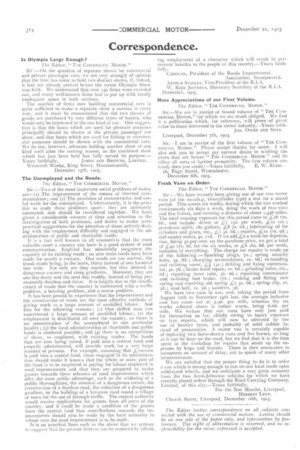The Unemployed and the Roads.
Page 16

If you've noticed an error in this article please click here to report it so we can fix it.
The Editor, " THE COMMERCIAL MoToa."
Sir :--Two of the most important social problems of to-day are-(i) The improvement of the means of internal communication; and (2) The provision of remunerative and useful work for the unemployed. Unfortunately, it is the practice to study these problems apart : they are intimately connected, and should be considered together. We have given a considerable amount of time and attention to the investigation of both problems, and desire to make some practical suggestions for the attention of those actively dealing with the employment difficulty and engaged in the administration of public and charitable funds.
It is a fact well known to all economists that the most valuable asset a country can have is a good system of road communication. England has admittedly outgrown the capacity of its existing roads : no new main roads have been made for nearly a century. Our roads are too narrow, the trunk roads being, in the main, thirty instead of one hundred feet wide. Not only are they narrow, but they abound in dangerous corners and steep gradients. Moreover, they are one day dusty and the next day muddy, instead of being permanently dustless and clean. It is largely due to the insufficiency of roads that the country is confronted with a traffic problem, a housing problem, and a motor problem. It has been proved by experience that the improvement and the construction of roads are the most effective methods of giving work to a large amount of unskilled labour. And this for the following reasons : (1) One skilled man can superintend a large amount of unskilled labour; (2) the employment is distributed all over the country, so there is no concentration of the unemployed in one particular locality ; (3) the local administration of charitable and public funds is rendered possible; and (4) there is no competition of those, so employed, with existing trades. The funds that are now being raised, if paid into a central fund and properly administered, will provide work for a very large number of persons. For example, assuming that Lioo,000 is paid into a central fund, those engaged in its administration should make it known that the whole or some part of the fund is to be employed in paying for labour employed in road improvements and that they are prepared to make grants towards those schemes of road improvement which offer the most public advantage, such as the widening of a public thoroughfare, the removal of a dangerous corner, the construction of a dustless road, the reduction of a dangerous gradient, or the building of a bye-pass road round a village or town for the use of through traffic. The central authority would receive applications for grants from all parts of the country, and it could be made a condition of the grants from the central fund that contributions towards the improvements should also be made by the local authority in whose area the road improvement is to be made.
It is on 'practical lines such as the above that we venture to suggest that the present distress can be removed by afford Mg employment of a character which will result in permanent benefits to the people of this country.-Yours CaDooaN, President of the Roads Improvement Association, Incorporated.
ARTHUR STANLEY, Vice-President of the R.1.A. W. REES JEFExavs, Honorary Secretary of the December, J905.


















